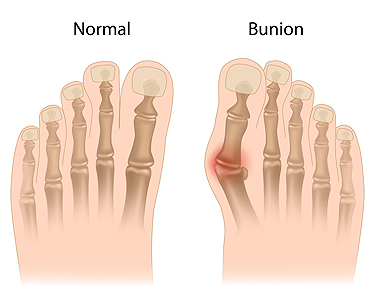 When pressure is put on the joint of the big toe over a period of time, a foot condition referred to as a bunion may develop. This foot deformity ultimately causes a bump on the side of the big toe to form. Signs of a bunion include pain in the joint of the big toe, numbness of the big toe, or trouble walking. As bunions get more severe, they can alter the appearance of the foot. While tight fitting shoes are the most common cause of bunions, arthritis, high heels, and genetics can all lead to the development of bunions as well. If you are suffering from bunion pain, it is important to consult with a podiatrist for a proper diagnosis and treatment. Treatment options include wearing wide toe shoes, orthotics, icing the foot, and in severe cases, surgery.
When pressure is put on the joint of the big toe over a period of time, a foot condition referred to as a bunion may develop. This foot deformity ultimately causes a bump on the side of the big toe to form. Signs of a bunion include pain in the joint of the big toe, numbness of the big toe, or trouble walking. As bunions get more severe, they can alter the appearance of the foot. While tight fitting shoes are the most common cause of bunions, arthritis, high heels, and genetics can all lead to the development of bunions as well. If you are suffering from bunion pain, it is important to consult with a podiatrist for a proper diagnosis and treatment. Treatment options include wearing wide toe shoes, orthotics, icing the foot, and in severe cases, surgery.
If you are suffering from bunion pain, contact one of our podiatrists of Grobowski Foot & Ankle. our doctors can provide the care you need to keep you pain-free and on your feet.
What Is a Bunion?
Bunions are painful bony bumps that usually develop on the inside of the foot at the joint of the big toe. As the deformity increases over time, it may become painful to walk and wear shoes. Women are more likely to exacerbate existing bunions since they often wear tight, narrow shoes that shift their toes together. Bunion pain can be relieved by wearing wider shoes with enough room for the toes.
Causes
- Genetics – some people inherit feet that are more prone to bunion development
- Inflammatory Conditions - rheumatoid arthritis and polio may cause bunion development
Symptoms
- Redness and inflammation
- Pain and tenderness
- Callus or corns on the bump
- Restricted motion in the big toe
In order to diagnose your bunion, your podiatrist may ask about your medical history, symptoms, and general health. Your doctor might also order an x-ray to take a closer look at your feet. Nonsurgical treatment options include orthotics, padding, icing, changes in footwear, and medication. If nonsurgical treatments don’t alleviate your bunion pain, surgery may be necessary.
If you have any questions, please feel free to contact one of our offices located in Bellevue, Seattle, and Issaquah, WA, . We offer the newest diagnostic and treatment technologies for all your foot care needs.
Read more about What Are Bunions?